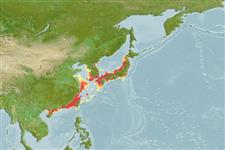Teleostei (teleosts) >
Eupercaria/misc (Various families in series Eupercaria) >
Sparidae (Porgies)
Etymology: Acanthopagrus: Greek, akantha = thorn + Greek, pagros, a kind of fish (Ref. 45335).
More on author: Bleeker.
Environment: milieu / climate zone / depth range / distribution range
Ecology
Marine; brackish; demersal; depth range 15 - ? m. Subtropical; 43°N - 20°N, 107°W - 143°W
Northwest Pacific: southern Hokkaido, Japan to the southern Korean Peninsula, middle and north coast of the Republic of China and Taiwan. Not occurring in the Ryukyu Islands.
Length at first maturity / Size / Weight / Age
Maturity: Lm 29.1, range 10 - ? cm
Max length : 50.0 cm SL male/unsexed; (Ref. 559); max. published weight: 3.2 kg (Ref. 40637)
Found in bays, shallow rocky reefs, and in brackish waters (Ref. 41299). Feeds on mollusks and polychaetes. Spawns in the spring and summer months (Ref. 41299). It is parasitised by the monogenean A. spari on the fins and body surface (Ref. 124057).
Sex change occurs at about 5 years of age (Ref. 36558).
Masuda, H., K. Amaoka, C. Araga, T. Uyeno and T. Yoshino, 1984. The fishes of the Japanese Archipelago. Vol. 1. Tokai University Press, Tokyo, Japan. 437 p. (text). (Ref. 559)
IUCN Red List Status (Ref. 130435)
Threat to humans
Harmless
Human uses
Fisheries: commercial; aquaculture: commercial; gamefish: yes
Tools
Special reports
Download XML
Internet sources
Estimates based on models
Preferred temperature (Ref.
123201): 13.1 - 25.4, mean 23.7 °C (based on 68 cells).
Phylogenetic diversity index (Ref.
82804): PD
50 = 0.5000 [Uniqueness, from 0.5 = low to 2.0 = high].
Bayesian length-weight: a=0.02138 (0.01284 - 0.03560), b=2.99 (2.85 - 3.13), in cm total length, based on LWR estimates for this species & Genus-body shape (Ref.
93245).
Trophic level (Ref.
69278): 3.2 ±0.45 se; based on food items.
Resilience (Ref.
120179): Medium, minimum population doubling time 1.4 - 4.4 years (tm=2).
Fishing Vulnerability (Ref.
59153): Moderate vulnerability (37 of 100).
Climate Vulnerability (Ref.
125649): Very high vulnerability (81 of 100).
Nutrients (Ref.
124155): Calcium = 85.9 [43.0, 149.5] mg/100g; Iron = 1.07 [0.60, 2.18] mg/100g; Protein = 19.5 [18.3, 20.6] %; Omega3 = 0.279 [0.169, 0.478] g/100g; Selenium = 22.2 [10.4, 45.1] μg/100g; VitaminA = 6.4 [1.9, 21.1] μg/100g; Zinc = 0.786 [0.522, 1.168] mg/100g (wet weight);
